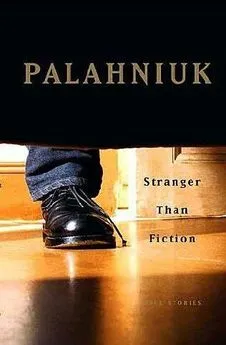Chuck Palahniuk - Stranger Than Fiction (True Stories)
- Название:Stranger Than Fiction (True Stories)
- Автор:
- Жанр:
- Издательство:неизвестно
- Год:неизвестен
- ISBN:нет данных
- Рейтинг:
- Избранное:Добавить в избранное
-
Отзывы:
-
Ваша оценка:
Chuck Palahniuk - Stranger Than Fiction (True Stories) краткое содержание
"Full of wonderful moments…Palahniuk's voice is so distinctive and intimate-he writes as though he is recounting a great story to a close friend." — Los Angeles Times
"Step into Palahniuk's dark worldview and watch for what crawls out. These stories are true to him and no one else." — The Oregonian
“One of the oddest and most oddly compelling collections to come along for some time.” —The Milwaukee Journal Sentinel
“In Chuck Palahniuk’s world, the ride is fast, often disturbing, and there is never any holding back.” —The New Orleans Times-Picayune
“Eccentric, idiosyncratic, and often entertaining.” —The Onion
"Priceless grace notes from an exceptionally droll and sharp-eyed observer." — The New York Times
“Rarely does a collection of essays continually resonate with a main theme and accumulate a weight that would lead you to call it a great book. . This is a pretty great book.” —The Seattle Times
"The book's lurid appeal rests largely on being let in on Palahniuk's secrets, the raw material for much of his fiction. . Acts that give spice to his novels are made more menacing when encountered in the real world." — Black Book
Stranger Than Fiction (True Stories) - читать онлайн бесплатно полную версию (весь текст целиком)
Интервал:
Закладка:
You were an escort, and this was the place where young people with no insurance went to die. The hospice name, I don't even remember. It wasn't on any signs anywhere, and they asked you to be discreet coming and going because the neighbors didn't know what was going on in the enormous old house on their street, a street with its share of crack houses and drive-by shootings, still nobody wanted to live next door to this: four people dying in the living room, two in the dining room. At least two people lay dying in each upstairs bedroom, and there were a lot of bedrooms. At least half these people had AIDS, but the house didn't discriminate. You could come here and die of anything.
The reason I was there was my job. This meant lying on my back on a creeper with a two-hundred-pound class-8 diesel truck driveline lying on my chest and running down between my legs as far as my feet. My job is I had to roll under trucks as they crept down an assembly line, and I installed these drivelines. Twenty-six drivelines every eight hours. Working fast as each truck moved along, pulling me into the huge blazing-hot paint ovens just a few feet down the line.
My degree in journalism couldn't get me more than five dollars an hour. Other guys in the shop had the same degree, and we joked how liberal arts degrees should include welding skills so you'd at least pick up the extra two bucks an hour our shop paid grunts who could weld. Someone invited me to their church, and I was desperate enough to go, and at the church they had a potted ficus they called a Giving Tree, decorated with paper ornaments, each ornament printed with a good deed you could choose.
My ornament said: Take a hospice patient on a date.
That was their word, "date." And there was a phone number.
I took the man with one leg, then him and his mother, all over the area, to scenic viewpoints, to museums, his wheelchair folded up in the back of my fifteen-year-old Mercury Bobcat. His mother smoking, silent. Her son was thirty years old, and she had two weeks of vacation. At night, I'd take her back to her TravelLodge next to the freeway, and she'd smoke, sitting on the hood of my car, talking about her son already in the past tense. He could play the piano, she said. In school, he earned a degree in music, but ended up demonstrating electric organs in shopping-mall stores.
These were conversations after we had no emotions left.
I was twenty-five years old, and the next day I was back under trucks with maybe three or four hours sleep. Only now my own problems didn't seem very bad. Just looking at my hands and feet, marveling at the weight I could lift, the way I could shout against the pneumatic roar of the shop, my whole life felt like a miracle instead of a mistake.
In two weeks the mother was gone home. In another three months, her son was gone. Dead, gone. I drove people with cancer to see the ocean for their last time. I drove people with AIDS to the top of Mount Hood so they could see the whole world while there was still time.
I sat bedside while the nurse told me what to look for at the moment of death, the gasping and unconscious struggle of someone drowning in their sleep as renal failure filled their lungs with water. The monitor would beep every five or ten seconds as it injected morphine into the patient. The patient's eyes would roll back, bulging and entirely white. You held their cold hand for hours, until another escort came to the rescue, or until it didn't matter.
The mother in Wisconsin sent me an afghan she'd crocheted, purple and red. Another mother or grandmother I'd escorted sent me an afghan in blue, green, and white. Another came in red, white, and black. Granny squares, zigzag patterns. They piled up at one end of the couch until my housemates asked if we could store them in the attic.
Just before he'd died, the woman's son, the man with one leg, just before he'd lost consciousness, he'd begged me to go into his old apartment. There was a closet full of sex toys. Magazines. Dildos. Leatherwear. It was nothing he wanted his mother to find, so I promised to throw it all out.
So I went there, to the little studio apartment, sealed and stale after months empty. Like a crypt, I'd say, but that's not the right word. It sounds too dramatic. Like cheesy organ music. But in fact, just sad.
The sex toys and anal whatnots were just sadder. Orphaned. That's not the right word either, but it's the first word that comes to mind.
The afghans are still boxed and in my attic. Every Christmas a housemate will go look for ornaments and find the afghans, red and black, green and purple, each one a dead person, a son or daughter or grandchild, and whoever finds them will ask if we can use them on our beds or give them to Goodwill.
And every Christmas I'll say no. I can't say what scares me more, throwing away all these dead children or sleeping with them.
Don't ask me why, I tell people. I refuse to even talk about it. That was all ten years ago. I sold the Bobcat in 1989. I quit being an escort.
Maybe because after the man with one leg, after he died, after his sex toys were all garbage-bagged, after they were buried in the Dumpster, after the apartment windows were open and the smell of leather and latex and shit was gone, the apartment looked good. The sofa bed was a tasteful mauve, the walls and carpet, cream. The little kitchen had butcher-block countertops. The bathroom was all white and clean.
I sat there in the tasteful silence. I could've lived there.
Anyone could've lived there.
Almost California
The infection on my shaved head is finally starting to heal when I get the package in the mail today.
Here's the screenplay based on my first novel, Fight Club.
It's from 20th Century Fox. The agent in New York said this would happen. It's not like I wasn't warned. I was even a little part of the process. I went down to Los Angeles and sat through two days of story conferences where we jerked the plot around. The people at 20th Century Fox got me a room at the Century Plaza. We drove through the studio backlot. They pointed out Arnold Schwarzenegger. My hotel room had a giant whirlpool tub, and I sat in the middle of it and waited most of an hour for it to fill enough that I could turn on the bubble jets. In my hand was my little bottle of mini-bar gin.
The infection on my head was from the day before I was going to Hollywood. I was getting flown to LAX, so what I did is run down to the Gap and try to buy a pumpkin-colored polo shirt. The idea was to look Southern Californian.
The infection was from not reading the directions on a tube of men's depilatory. This is like Nair or Neet, but extra-strong, for black men to shave their faces with.
Right on the tube of Magic brand men's depilatory, it says in all caps: DO NOT USE WITH A RAZOR. This is even underlined. The infection was not the fault of the package designers at Magic. Fast-forward to me sitting in my Century Plaza whirlpool tub. Water rushes in, but the tub is so big that even after half an hour, I'm just sitting there with my gin and my shaved head with my butt in a little puddle of warm water. The walls of the tub are marble, chilled to ice-cold by the air conditioning. The little almond soaps are already packed in my suitcase.
The check from the movie option is already in my bank account.
The bathroom is lined with huge mirrors and indirect lighting, so I can see myself from every angle, naked and wallowing in an inch of water with my drink getting warm. This is everything I wanted to make real. The whole time you're writing, some less-than-Zen little polyp of your brain wants to be flying first-class to LAX. You want to pose for book-jacket photos. You want for there to be a media escort standing at the gate when you get off the plane, and you want to be chauffeured, not delivered, but chauffeured from dazzling interview to glittering book-signing event.
This is the dream. Admit it. Probably, you'd be more shallow than that. Probably, you'd want to be trading toenail secrets with Demi Moore in the green room just before you go onstage as a guest on the David Letterman show.
Yeah. Well, welcome to the market for literary fiction.
Your book has about a hundred days on the bookstore shelf before it's an official failure.
After that, the stores start returning the books to your publisher and prices start to fall. Books don't move. Books go to the shredder.
Your little chunk of your heart, the little first novel you wrote, your heart gets slashed 70 percent, and still nobody wants it.
Then you find yourself at the Gap trying on pastel knit shirts and squinting when you look in the mirror so you look almost good. Almost California. There's the movie deal to support-your hope is, now, that will save your book. Just because a big publisher is doing my first novel, that doesn't make me attractive. Lazy and stupid come to mind. When it comes to being attractive and fun to be around, I just can't compete. Stepping off the airplane in Los Angeles with my hair sprayed and wearing a salmon-colored polo shirt was not going to help.
Having the publicist at the big publishing house call everybody and tell them I was attractive and fun was only going to give people false hope.
The only thing worse than showing up at LAX ugly is showing up ugly but showing signs that you really tried to look good. You gave it your best effort but this is the best you could do. Your hair's cut and skin's tanned, your teeth are flossed and the hair in your nose is tweezed, but you still look ugly. You're wearing a 100 percent cotton casual knit shirt from the Gap. You gargled. You used eyedrops and deodorant, but you still come off the plane missing a few chromosomes.
That wasn't going to happen to me.
The idea was to make sure nobody thought I was even trying to look good. The idea was to wear the clothes I wore every day. To remove any risk of failed hairstyling, I'd shave my head.
This wasn't the first time I'd shaved my head. Most of the time I was writing Fight Club I had that blue, shaved-head look. Then, what can I say, my hair grew back. It was cold. I had hair when it came time to take my book-jacket photo, not that hair helped.
Even when they took my picture for the jacket, the photographer made it clear the pictures would turn out ugly, and it was not her fault.
So I left all the new colors of polo shirts including pumpkin, terra cotta, saffron, and celadon at the Gap, and I went and didn't read the directions on a tube of men's depilatory. I frosted my head with the stuff, and I started to hack at my scalp with a razor. The only thing worse you could do is get water mixed in the depilatory. So I ran hot water over my head.
Imagine your head slashed with razor cuts and then throwing lye on the cuts.
Tomorrow, I was going to Hollywood. That night, I couldn't get my head to stop bleeding. Little bits of toilet paper were stuck all over my swelled-up scalp. It was a sort of papier-mâché look, with my brains inside. I felt better when my head started to scab, but then the red parts were still swollen. The blue stubble of hair started pushing up from underneath scabs. The ingrown hairs made little whiteheads I had to squeeze.
It was: The Elephant Man goes to Hollywood.
The people at the airline hustled me onboard, fast, like a donor organ. When I reclined my seat back, my scabs stuck to the little paper headrest cover. After our touchdown, the flight attendant had to peel it off. This probably wasn't the peak experience of her day, either.
This is why I write.
The infected head thing just got worse. Everyone meeting me looked legendary, like all the guys were JFK Jr. All the women were Uma Thurman. At all the restaurants we went to, execs from Warner Brothers and Tri-Star would come over and talk about their latest project.
Читать дальшеИнтервал:
Закладка:








